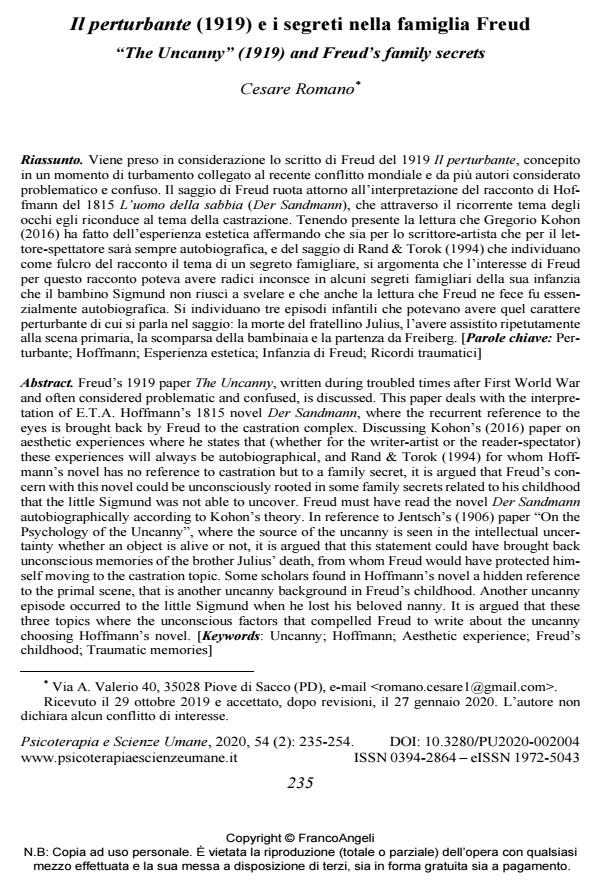"The Uncanny" (1919) and Freud’s family secrets
Journal title PSICOTERAPIA E SCIENZE UMANE
Author/s Cesare Romano
Publishing Year 2020 Issue 2020/2
Language Italian Pages 20 P. 235-254 File size 126 KB
DOI 10.3280/PU2020-002004
DOI is like a bar code for intellectual property: to have more infomation
click here
Below, you can see the article first page
If you want to buy this article in PDF format, you can do it, following the instructions to buy download credits

FrancoAngeli is member of Publishers International Linking Association, Inc (PILA), a not-for-profit association which run the CrossRef service enabling links to and from online scholarly content.
Freud’s 1919 paper The Uncanny, written during troubled times after First World War and often considered problematic and confused, is discussed. This paper deals with the interpretation of E.T.A. Hoffmann’s 1815 novel Der Sandmann, where the recurrent reference to the eyes is brought back by Freud to the castration complex. Discussing Kohon’s (2016) paper on aesthetic experiences where he states that (whether for the writer-artist or the reader-spectator) these expe-riences will always be autobiographical, and Rand & Torok (1994) for whom Hoffmann’s novel has no reference to castration but to a family secret, it is argued that Freud’s concern with this novel could be unconsciously rooted in some family secrets related to his childhood that the little Sigmund was not able to uncover. Freud must have read the novel Der Sandmann autobiograph-ically according to Kohon’s theory. In reference to Jentsch’s (1906) paper "On the Psychology of the Uncanny", where the source of the uncanny is seen in the intellectual uncertainty whether an object is alive or not, it is argued that this statement could have brought back unconscious memo-ries of the brother Julius’ death, from whom Freud would have protected himself moving to the castration topic. Some scholars found in Hoffmann’s novel a hidden reference to the primal sce-ne, that is another uncanny background in Freud’s childhood. Another uncanny episode occurred to the little Sigmund when he lost his beloved nanny. It is argued that these three topics where the unconscious factors that compelled Freud to write about the uncanny choosing Hoffmann’s nov-el.
Keywords: Uncanny; Hoffmann; Aesthetic experience; Freud’s childhood; Traumatic memories
Cesare Romano, Il perturbante (1919) e i segreti nella famiglia Freud in "PSICOTERAPIA E SCIENZE UMANE" 2/2020, pp 235-254, DOI: 10.3280/PU2020-002004